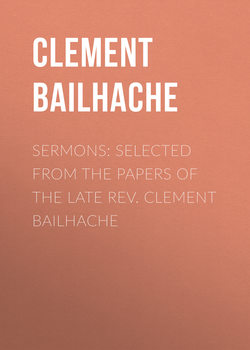Sermons: Selected from the Papers of the Late Rev. Clement Bailhache

Реклама. ООО «ЛитРес», ИНН: 7719571260.
Оглавление
Clement Bailhache. Sermons: Selected from the Papers of the Late Rev. Clement Bailhache
INTRODUCTION BY THE EDITOR
I. SALVATION
II. PROPITIATION
III. FAITH IN THE SAVIOUR
IV. SINCERITY OF HEART NECESSARY TO THE UNDERSTANDING OF THE GOSPEL
V. THE HUMBLE TAUGHT THE LORD’S WAY
VI. THE GRATITUDE OF THE PARDONED
VII. CONSECRATION
VIII. CHRISTIANITY IN OUR DAILY LIFE
IX. UNCONSCIOUS INFLUENCE
X. SECULAR ANXIETY
XI. CONTENTMENT
XII. JOY
XIII. SICKNESS
XIV. JESUS ONLY
XV. PRAYER
XVI. ASSURANCE
XVII. IMMORTALITY
XVIII. HEAVEN
Отрывок из книги
“The grace of God that bringeth salvation hath appeared to all men, teaching us that, denying ungodliness and worldly lusts, we should live soberly, righteously, and godly, in this present world; looking for that blessed hope, and the glorious appearing of the great God and our Saviour Jesus Christ; who gave Himself for us, that He might redeem us from all iniquity, and purify unto Himself a peculiar people, zealous of good works.” – Titus ii. 11-14.
Briefly stated, the consequences of the Fall were these – that man became unholy in point of character, and guilty in point of law. The first covenant God made with man was a covenant of law, and the two “trees” shadowed forth, the one the condition, the other the benefit, of such a covenant. “The tree of the knowledge of good and evil” points to obedience as the condition; and “the tree of life” points to life, in its fullest and most spiritual sense, as the benefit. Man disobeyed. He failed to fulfil the condition, and thus he lost the blessing. Henceforth, if there is to be any blessing for him, it must come on some other ground, and from some higher source. Having forfeited all hope from law, his only possible hope must come, if it come at all, from mercy.
.....
Freedom from condemnation and regeneration are indissolubly connected together in God’s idea of salvation, and He achieves both by the work of Christ His Son. This redemption from the love, and consequently from the power of sin, is accomplished by Him on a principle which is divinely simple and efficacious; a principle which lies at the root of the theory of evangelical sanctification. This principle is the love which He excites in us by the manifestation of His own love to us. Thus the Apostle John writes: “Whosoever abideth in Him sinneth not; whosoever sinneth hath not seen Him, neither known Him” (1 John iii. 6). “He that loveth not, knoweth not God, for God is love” (1 John iv. 8). To love God, and, under the constraining influence of love, to serve Him, we have need to know and to realise how great is the love of God to us.
Now this Divine love has been revealed to the world through the medium of that same Saviour, who by His sacrificial death has opened up the way for our pardon and our restoration to the Divine favour. The Son of God came into the world to reveal the heart of the Father. What greater gift could God have bestowed than that of His Divine Son? What greater proof of love could He have exhibited than that which this greatest of all possible gifts presents? “God so loved.” And Christ has perfectly performed His mission. His whole ministry was a declaration of the Divine love. Of that love His death on the cross was the sublimest expression. We learn therefrom not only that God manifests to us His mercy, but also at what cost. Our debt must be paid; and as we are bankrupt, He pays it on our behalf. And who is our Substitute? Not a man, not an angel, not any creature; but the Divine Son, “by whom God made the worlds and upholds them by the word of His power,” “who is the brightness of the Father’s glory and the express image of His person” – it was He who “by Himself purged our sins.” Such is the love of God. We cannot fathom it, for it is Divine; but in proportion as we are enabled to “know” it, we say “We love Him because He first loved us;” “We are bought with a price: we are not our own.” And we say our devout “Amen!” when the chiefest Apostle of mercy says to us: “I beseech you, therefore, brethren, by the mercies of God, that ye present your bodies a living sacrifice, holy, acceptable unto God, which is your reasonable service.”
.....